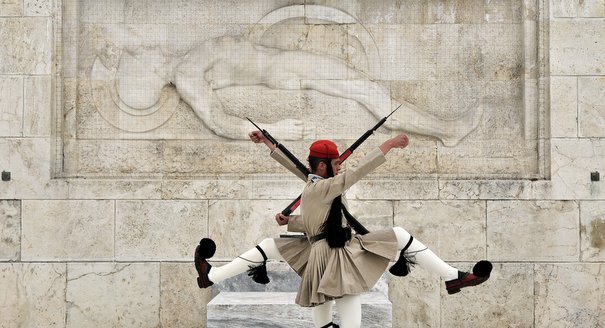Briefly, the first camp said Greece had to maintain its high levels of defense expenditure because of Turkey. The region, claim the respondents, was far from stable because of Turkey’s intentions (they were never fully explained).
The second group of respondents, again, blamed the outside: It was France and Germany that insisted that Greece purchase their military equipment in return for receiving financial support to prop up the euro.
The third group consisted of respondents fed-up with Greece always using the external threat as an excuse or blaming others except themselves for the mess they are in right now.
The fourth, and smallest group, said Greece was not in any case ready to join the euro in the first place. Reading between the lines, the EU member states that supported Greece’s entry to the EU and the eurozone should shoulder some of the blame.
Let me take each of those claims.
Blaming Turkey
The Wikileaks are old and not fully substantiated with regard to Turkey’s intentions towards Greece. Greece’s relations with Turkey have improved immeasurably since the late 1990s.
Any mention of Cyprus must include the fact that it was the Greek Cypriots who rejected the UN peace deal. The Turkish Cypriots voted for it. That was a courageous step by the Turkish Cypriots. Unfortunately, it went nowhere.
The Greek Cypriots rejected the UN plan, while the EU completely mismanaged the Turkish Cypriots when Cyprus joined the EU in 2004. The EU is now paying the price for admitting the divided island. It is now so often held hostage to a Greek Cypriot veto or intransigence over dealing with Turkey.
Blaming French and German Arms Deals
There was no quid pro quo over the French and German military sales. Anyone involved in the sector knows how long it takes to agree to such deals. They are not made overnight.
Blaming Others
Blaming others is a natural reaction during a crisis. It’s not easy for the Greeks, especially the less well-off. Frankly, the political elites should come clean by saying how the system of tax collection, accountability, procurement contracts, and so many aspects of the administration were dysfunctional. The elites—and especially the two political families, the Karamanlis and Papandreou clans—turned a blind eye to those systemic failures.
Blaming the EU: Greece Not Ready to Join the Euro
And finally, Greece was not ready to join the euro. That was the consensus at the time. But a political decision was made. Europe is now paying a very high price for not having had the courage to tell Greece to wait a bit longer. Even then, when Greece did adopt the euro, the Commission was highly skeptical over the way Athens managed its accounts. The Commission just wasn’t diligent enough in taking Greece to task.
As for Greece joining the EU. Europe’s greatest strength is that it underpinned the democracies of Spain, Portugal, and Greece. For decades, they had been under the thumb of fascist dictators or military juntas. Looking back, joining the EU contributed enormously to the stability and the democratization of these three countries. That should not be forgotten.









